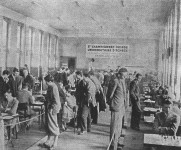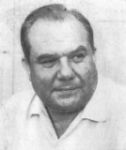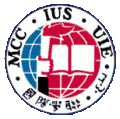World Student Team Chess Championship

The origins of the World Student Team Championship, commonly referred to as Student Olympiads, date back to 1952, when International Union of Students organized in Liverpool the so-called "Ist International Student Tournament", there was a miniature team tournament won by Finnish students and individual event won by two Soviets. The idea was raised as response to a growing need to energize student chess community, fairly inactive since the end of the WWII. The event was very successful and the parties agreed the consecutive students' meeting would be held next year. The "IInd International Student Tournament" of 8 teams took place in Brussels. At the third World Student Congress in Warsaw in 1953, it was declared that the "IIIrd International Student Tournament" would take part in Oslo, and it was so. The FIDE congress debating aftertime was so impressed by the success of the idea that it retroactively announced Czechoslovakia, the winners from Oslo, the "World Student Champions" along with taking patronage over the event. Some generic framework had been settled. The annual tournament, co-organized by FIDE and the IUS was to be played at 4 boards with each team having right to field up to two reserves. The system was round robin unless more than 14 teams participated in which case it ought to be split into the preliminaries and the finals. Age limit was temporarily set at 30 years with the demand that every participant must be sort of undergraduate student, but all of that wasn't very observant in the beginning.
| Jaroslav Šajtar (1921-2003) |
 was the Czech player and arbiter. IM 1950, IA 1955, honorary GM 1985. His peak years were in 1940s & 1950s, his best result being shared 2nd achieved in Warsaw in 1947. He played for Czechoslovakia at the 1952 and 1954 Olympiads. Later he devoted himself to the organisation of chess. Between 1954 and 1974 he was one of most prominent FIDE figures, serving a.o. as deputy president and president of Eastern European Zone. His excellent series on the Student Olympiads is unique deed in worldwide chess literature. His tireless efforts aimed at supporting and promoting academic chess deserve high praise, however politics sheds gloomy light on his biography; he was a communist and secret police agent. was the Czech player and arbiter. IM 1950, IA 1955, honorary GM 1985. His peak years were in 1940s & 1950s, his best result being shared 2nd achieved in Warsaw in 1947. He played for Czechoslovakia at the 1952 and 1954 Olympiads. Later he devoted himself to the organisation of chess. Between 1954 and 1974 he was one of most prominent FIDE figures, serving a.o. as deputy president and president of Eastern European Zone. His excellent series on the Student Olympiads is unique deed in worldwide chess literature. His tireless efforts aimed at supporting and promoting academic chess deserve high praise, however politics sheds gloomy light on his biography; he was a communist and secret police agent.
See puzzles from his games. |
|
The event enjoyed sheer support of contemporary FIDE president Folke Rogard and Kurt Vogel, head of Sports Department of IUS. But arguably the most prominent figure and the spiritus movens of the entire movement was Czech master and arbiter Jaroslav Šajtar, full of enthusiasm, energy and dedication to promoting academic chess and the Student Olympiads in particular. The event is mostly remembered because of his series of 22 books, each volume describing one of championships in details. In the course of time the event grew strong attracting many good players and careful attention of the chess community. The second Championship in Lyon, France in 1955 ended as a great success confirming the correctness of the decision to organise the event on the regular basis. In April 1956 Mongolian students arrived, which was their very first international chess appearance. Only half of a year later they went to take part in the Moscow Olympiad. In 1957 exceptionally strong Soviet team, led by future World Champions Tal and Spassky, won all of 13 matches. Next year Student Olympiad passed off successfully in Golden Sands near Varna contributing greatly to the idea of organizing an Olympiad in Bulgaria, which came true in 1962. In 1959 a sensation happened. The Bulgarian team, runners-up from two previous championships overtook weakened Soviet team taking gold medals. These two and Hungary conceded no match loss.
With a view to still further improving the organisational side of the event the 1960 FIDE congress worked out
a set of rules based on a similar basis to the rules for chess Olympiads. Age limit was fixed at 27 years. It was explicitly stated that every participant must be university student or be receiving education with a view to get a professional diploma.
| International Union of Students |
 IUS was founded in 1946 in Prague by student organisations of 43 countries present at the World Student Congress. Although students from all over the world were among the founders the movement originated from pro-communist "anti-fascist" coalition. The trendsettles were countries from behind the Iron Curtain and its financial background were government subsidies donated by communist countries. In its prime IUS organized +150 student unions being substantial advisory body at UNESCO. After collapse of communism IUS plunged in deep crisis. Financial devastation forced them to get rid of their most valuable assets, including hostels and other estates in Prague. They are hardly alive these days, since nobody seems to take care. Politically they are at the far left promoting socialist and social-democratic views on public issues. IUS was founded in 1946 in Prague by student organisations of 43 countries present at the World Student Congress. Although students from all over the world were among the founders the movement originated from pro-communist "anti-fascist" coalition. The trendsettles were countries from behind the Iron Curtain and its financial background were government subsidies donated by communist countries. In its prime IUS organized +150 student unions being substantial advisory body at UNESCO. After collapse of communism IUS plunged in deep crisis. Financial devastation forced them to get rid of their most valuable assets, including hostels and other estates in Prague. They are hardly alive these days, since nobody seems to take care. Politically they are at the far left promoting socialist and social-democratic views on public issues.
IUS home page |
|
The 1960 Student Olympiad was held in Leningrad. The Americans bread Soviets in their own den defeating the hosts in the direct clash to take the trophy. Lombardy's exquisite result (12/13) and his win over Spassky in the decisive game remain one of tournament landmarks until today. The 9th championship held in Czechoslovakia in 1962 shall be remembered mainly because of fantastic beauty prize winner game Gufeld-Kavalek, arguably one of most prodigious games ever played. The 1963 was the only tournament ever to see the Soviet squad fall outside of the medal zone. As the event arrived at Cracow in 1964 the barrier of 20 participating nations was broken for the first time. The 12th championship which took part in Romania in 1965 gave first ominous signs of possible further deterioration of the prestige of the Student Olympiads. Many strong nations did not arrive (USA, Yugoslavia), some sent reserve teams hardly capable to keep pace with the rest (Bulgaria, Hungary, Czechoslovakia). USSR, led by Savon won by the narrow margin over Israel, who by a hair's breadth missed the title — they needed to beat the Soviets 3—1 on the last day and they missed it by just a fraction. The 1966 edition in Örebro is known from fantastic play of Czech GM Hort (11/13); USSR won ahead of Czechoslovakia and Denmark, who defended bronze medals from Sinaia. Next year's edition offers a lot of statistical oddities. England not only achieved historic 3—1 win over the Soviets but also managed to get bronze losing as much as 5 final group matches out of 9 played! On the contrary, Czechoslovakia came fourth defeating all of medal winners and losing only one match: 0—4 vs Romania. Long awaited West German team finally arrived in 1968 winning silver medals right off, only losing gold by match point count. In 1969 USSR, led by young Ukrainian Tukmakov, won sixth consecutive title ahead of Yugoslavia who were back on top after six year long collapse.
The 1970 championship was awarded to Israel which proved to become a nail to the coffin of the Student Olympiads. At the time, Israel was engaged in a vicious political conflict with Soviet supported Arab nations which forced Eastern European countries to boycott the Haifa Championship under the pretence of interfering politics and chess. By strange coincidence same story happened in 1976 when Chess Olympiad was awarded to Haifa. What is more, USA won both truncated tournaments. The 1971 edition was played in Puerto Rico, distant from point of view of European countries. With the absence of most top nations USSR won edging out USA by a record margin of 8 points earned in 8 rounds. Moreover, the Soviet team with 20-year old Karpov at board #3 won six medals for best individual results out of six possible. The 1972 Championship held in Graz was the last of the glory list. A record number of 29 teams took part, including all strongest sides. The Soviets having four GMs at their disposal shoot ahead by clear 9 points; Hungary and West Germany tied at second. The 1973 championship scheduled in Ecuador was cancelled, the student teams met again in 1974 in England; USSR won again ahead of USA and Hungary. Another void time was year 1975. Editions numbered 21st and 22nd took place in Latin America in 1976 and 1977 respectively and happened to be the last of the series; USSR won both events under the absence of toughest opposition. The 1970s, however, were very far from peak times of late 1950s, since prestige and pressure abated. Due to growing number of international chess events and emerging financial constraints (following worldwide oil crisis) a lot of strong chess nations ceased to send their teams; those who did actually sent reserve teams as a rule (apart from the Soviets maybe, who started to treat the Student Olympiads in all seriousness). The FIDE congress held in 1977 in Mexico City decided that the Student Team Championship would be held from then on in a biennial cycle every odd year, while
World Youth U26 Team Championship was created to be held every even year. The 1979 event scheduled in Bulgaria, however, did not take effect. Parties apparently seemed to have lost interest in it, but the 1981 edition was awarded to Austria anyway. As it happened, it was played in Austria in 1981 indeed, but as Youth U26 Championship. Then the Student Olympiads were officially cancelled, after 25 years of existence and 22 editions that brought attraction of the chess world and saw many future chess stars including Spassky, Tal, Bronstein, Taimanov, Korchnoi, Lombardy, Filip, Ólafsson, Ivkov, Matanović, Portisch, Bilek, Hort, to name just a few.
Winners: 17x Soviet Union, 2x Czechoslovakia, 2x United States, 1x Bulgaria
 The origins of the World Student Team Championship, commonly referred to as Student Olympiads, date back to 1952, when International Union of Students organized in Liverpool the so-called "Ist International Student Tournament", there was a miniature team tournament won by Finnish students and individual event won by two Soviets. The idea was raised as response to a growing need to energize student chess community, fairly inactive since the end of the WWII. The event was very successful and the parties agreed the consecutive students' meeting would be held next year. The "IInd International Student Tournament" of 8 teams took place in Brussels. At the third World Student Congress in Warsaw in 1953, it was declared that the "IIIrd International Student Tournament" would take part in Oslo, and it was so. The FIDE congress debating aftertime was so impressed by the success of the idea that it retroactively announced Czechoslovakia, the winners from Oslo, the "World Student Champions" along with taking patronage over the event. Some generic framework had been settled. The annual tournament, co-organized by FIDE and the IUS was to be played at 4 boards with each team having right to field up to two reserves. The system was round robin unless more than 14 teams participated in which case it ought to be split into the preliminaries and the finals. Age limit was temporarily set at 30 years with the demand that every participant must be sort of undergraduate student, but all of that wasn't very observant in the beginning.
The origins of the World Student Team Championship, commonly referred to as Student Olympiads, date back to 1952, when International Union of Students organized in Liverpool the so-called "Ist International Student Tournament", there was a miniature team tournament won by Finnish students and individual event won by two Soviets. The idea was raised as response to a growing need to energize student chess community, fairly inactive since the end of the WWII. The event was very successful and the parties agreed the consecutive students' meeting would be held next year. The "IInd International Student Tournament" of 8 teams took place in Brussels. At the third World Student Congress in Warsaw in 1953, it was declared that the "IIIrd International Student Tournament" would take part in Oslo, and it was so. The FIDE congress debating aftertime was so impressed by the success of the idea that it retroactively announced Czechoslovakia, the winners from Oslo, the "World Student Champions" along with taking patronage over the event. Some generic framework had been settled. The annual tournament, co-organized by FIDE and the IUS was to be played at 4 boards with each team having right to field up to two reserves. The system was round robin unless more than 14 teams participated in which case it ought to be split into the preliminaries and the finals. Age limit was temporarily set at 30 years with the demand that every participant must be sort of undergraduate student, but all of that wasn't very observant in the beginning. was the Czech player and arbiter. IM 1950, IA 1955, honorary GM 1985. His peak years were in 1940s & 1950s, his best result being shared 2nd achieved in Warsaw in 1947. He played for Czechoslovakia at the 1952 and 1954 Olympiads. Later he devoted himself to the organisation of chess. Between 1954 and 1974 he was one of most prominent FIDE figures, serving a.o. as deputy president and president of Eastern European Zone. His excellent series on the Student Olympiads is unique deed in worldwide chess literature. His tireless efforts aimed at supporting and promoting academic chess deserve high praise, however politics sheds gloomy light on his biography; he was a communist and secret police agent.
was the Czech player and arbiter. IM 1950, IA 1955, honorary GM 1985. His peak years were in 1940s & 1950s, his best result being shared 2nd achieved in Warsaw in 1947. He played for Czechoslovakia at the 1952 and 1954 Olympiads. Later he devoted himself to the organisation of chess. Between 1954 and 1974 he was one of most prominent FIDE figures, serving a.o. as deputy president and president of Eastern European Zone. His excellent series on the Student Olympiads is unique deed in worldwide chess literature. His tireless efforts aimed at supporting and promoting academic chess deserve high praise, however politics sheds gloomy light on his biography; he was a communist and secret police agent. IUS was founded in 1946 in Prague by student organisations of 43 countries present at the World Student Congress. Although students from all over the world were among the founders the movement originated from pro-communist "anti-fascist" coalition. The trendsettles were countries from behind the Iron Curtain and its financial background were government subsidies donated by communist countries. In its prime IUS organized +150 student unions being substantial advisory body at UNESCO. After collapse of communism IUS plunged in deep crisis. Financial devastation forced them to get rid of their most valuable assets, including hostels and other estates in Prague. They are hardly alive these days, since nobody seems to take care. Politically they are at the far left promoting socialist and social-democratic views on public issues.
IUS was founded in 1946 in Prague by student organisations of 43 countries present at the World Student Congress. Although students from all over the world were among the founders the movement originated from pro-communist "anti-fascist" coalition. The trendsettles were countries from behind the Iron Curtain and its financial background were government subsidies donated by communist countries. In its prime IUS organized +150 student unions being substantial advisory body at UNESCO. After collapse of communism IUS plunged in deep crisis. Financial devastation forced them to get rid of their most valuable assets, including hostels and other estates in Prague. They are hardly alive these days, since nobody seems to take care. Politically they are at the far left promoting socialist and social-democratic views on public issues.


